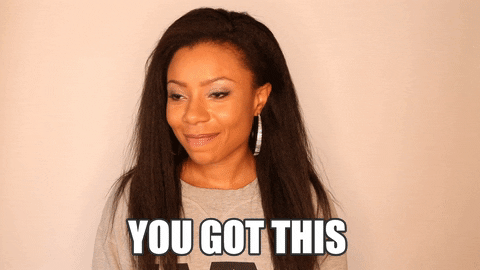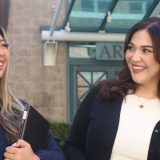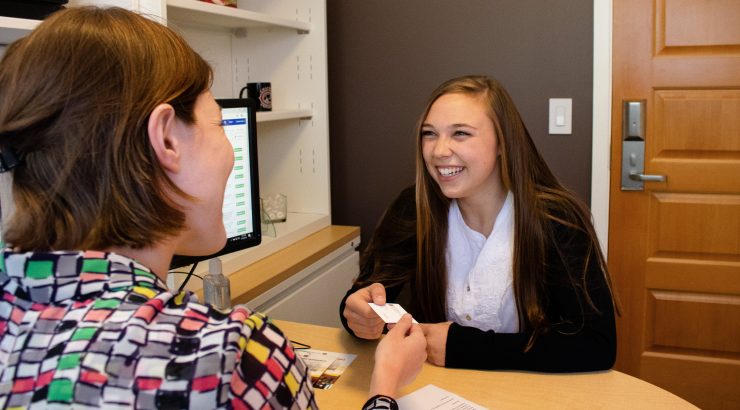
Top 5 Challenges Individuals Face Throughout the Interview Process Learn about the most common challenges that can occur before and during an interview and how to beat them!
November 23, 2021
You made it. You finally got the interview for the job that you have been dreaming about your whole life. You call your family and friends to let them know about this big moment in your life. After all of the initial excitement dies down, you start to worry about how to make the best first impression on your potential employers and come out of the interview confidently. Because of this, it is important to recognize those potential challenges and some possible solutions to make it your best interview yet!
Pre-Interview Jitters
Let’s face it- all of us have been through many nerve-racking situations throughout our lives, which includes the chance to interview for our dream job or internship. We never want our nerves to ruin the chance to land the job we have been wanting for our whole lives.
Because of this, it is important to have some calming techniques that can help you crush that interview and remain confident throughout it! Here are some tips to help you do so:
Practice Self Care
When trying to prepare for an interview, there is a lot of nervousness that builds up when practicing potential interview questions such as thinking about seeing your potential employers right in front of you at the interview table.
There are many different actions that you could do to reduce your stress or nervousness. Some ideas include practicing yoga, listening to music, meditating, getting a massage, or learning some relaxation techniques
Get enough sleep
During the days before the interview, you might find yourself not being able to rest or sleep because you might be anxious about the upcoming interview. There are a couple of things you could do to get that much-needed rest.
First, you can count to 10 slowly, repeat, and count to 20 if necessary. This technique will lower the anxiety and worry that is possibly  preventing you from getting a good night’s rest.
preventing you from getting a good night’s rest.
Another technique that is known to lead to a good night of sleep is when individuals participate in exercise during the day. After completing an exercise, your body is much more likely to go into a resting state. This is very important because when you are stressed, your body needs that valuable sleep and rest to ace that interview.
With that being said, don’t forget to get some physical activity in to help relieve your stress and help you get some quality sleep!
Not Knowing What to Wear
The next challenge that is commonly experienced before interviews is not knowing what outfit to wear. We all want to make sure that your potential employers know that you mean business when walking into the interview room, so it is super important that you dress the part.
Because of COVID-19, many employers are now conducting interviews via Zoom (or other online platforms), which means that there are often a lot of grey areas when it comes to what should be worn, but here is what we recommend for that important day.
Professional Attire
Generally, in-person interviews require that you dress to impress your employers and to also show that you mean business when walking to the interview room. Because of this, it is important to dress in professional/business interview attire when appropriate.
Some types of clothing that could be used with this type of attire could include a suit jacket, slacks with a shirt and tie, or a sweater and button-down. In addition, you could wear a blouse and dress pants or a statement dress.
With whatever you decide to wear, you should look professional and polished regardless of the position that you are trying to get.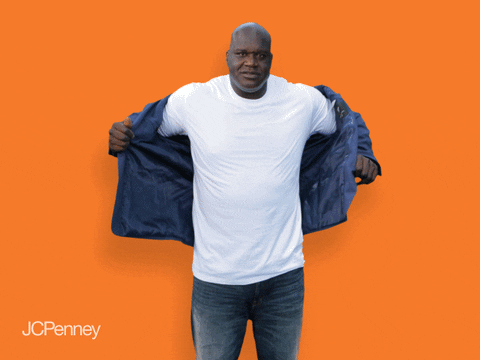
Casual Attire
If you find yourself interviewing for a job that is in a more informal work environment, you might consider wearing a business casual outfit. This might be applicable when applying for a job with a startup company.
When it comes to what type of clothing could be worn with business casual interview attire, include khakis and a polo shirt or button-down. These outfits are less formal than a suit but are much more professional compared to a T-shirt and shorts or a sundress and sandals.
Before you determine what type of outfit you are going to wear, make sure to look at any previous emails or communication from the individual(s) that are going to interview you to see if they would like you to dress a certain way.
If you aren’t sure about what you should wear, you can possibly call the office and ask the administrative coordinator, or contact the person who scheduled the interview and ask for advice on attire. You might also find that networking and conducting informational interviews (linked to networking tips handout) before an interview will help you figure out the culture of the workplace.
Difficult, Yet Simple Interview Questions
When meeting with your potential employers for the first time during an interview, the people interviewing you want to get to know you through a wide range of questions that can vary from general questions about yourself or getting to know the types of skills that you have mastered.
Here are some of the most common questions that most people have difficulty answering when in the interview and how to answer them in a productive and personal way.
“Tell us a little bit about yourself.”
At the start of the interview, people usually ask this question to ease into the actual interview that helps to create small talk, and also helps to direct where the interview will go from there. From my own personal experience, this is one of the hardest and stressful questions to answer in an interview.
Sometimes, I don’t know what parts about myself the people interviewing want to know about me or how much they want me to say. Because of this, it is important to be clear and concise when you answer this question. There are many different ways to formulate the answer to this question.
Lily Zhang, at the MIT Media Lab and writer for The Muse, recommends utilizing a formula for structuring your response by including the present, past, and future.
When referring to the present, make sure to talk about your current position, what your responsibilities are, and some of your biggest accomplishments.
Second, when talking about your past, it is important to talk about how you got to the role you are currently in and how it is relevant to the position that you are applying for. Finally, talk about the future and talk about why you are interested in the position you are interviewing for.
Note: This isn’t the only way to structure your response, but make sure whatever you choose to talk about relates back to the job and company!
Lastly, be conscious not to directly recite your resume. We want to keep the people interviewing you engaged in what you have to say.
“What is your greatest weakness?”
One of the hardest things to do for many of us is to be authentic and honest, but during a job or internship interview, this is one of the main things that employers expect you to do.
This is because employers want to know you can grow, both as a person and within the company. This means that it is important to have the best answer to this question in a way that is productive, yet informative and honest.
There are a couple of different ways that you could answer this question which includes discussing non-essential skills or mention skills that you have improved on. However, one of the best options that often gets a good reaction from employers is when you turn a negative aspect of yourself into a positive one.
For example, you can say that your frequent sense of urgency to complete your assigned projects means that you are a candidate who, when given a project, will make sure that it is done on time.
Regardless of what you say, it is super important to indicate that you are mindful of this trait and are able to prevent it from interfering with your productivity while working. This works because it shows the interviewer that you have good time management skills when working on tasks and projects.
Ending the Interview with “Do you have any questions or comments for us?”
Congrats! You made it to the end of the interview! Now that most of the nervousness and all of the tough questions have come to an end, it is time to decompress along with the person who is interviewing you.
There are a couple of different ways that employers like to do this, but one of the most common ways is by asking the question, “do you have any questions for us?” When you hear this, you might be annoyed because you feel that everything was covered during the interview, but this is a great chance to show your potential employers that you are interested enough in the position to want to learn more about the position.
Here is how you can get ready for possibly one of the most important questions of the interview.
Prepare for the Questions
Because this question is so common, it is important to develop a list of questions that you would like to be answered. If you would like, you could also tailor the questions to the person that is interviewing.
For example, if you were interviewing with someone from human resources (HR), you could ask about the interviewing process or about the overall structure of the company.
If you’re meeting with a person who is your potential manager or boss, you might want to ask questions about your intended role or about the hiring process for new employees.
Think about the questions that you would like to ask the interviewer
The questions that you ask should show that you are familiar with the goals and priorities of the company. In addition, make sure that you ask open-ended questions, instead of questions that can be answered with a ‘yes’ or ‘no’ answer. There are a few broad categories of questions that you are able to ask.
Questions about the role:
- Can you tell me more about the day-to-day responsibilities of this role? How would you describe a typical day in this role?
- If I were given the opportunity to get this job, what would you want me to achieve in my first two months?
- In your opinion, what is the single important indicator of success in this role?
Questions about the company:
- What’s something that makes you happy about coming to work each day?
- Can you tell me a little bit about company culture?
- What are some of the greatest challenges that are facing the company at the moment?
Questions to avoid:
While this is a chance to ‘interview’ the individual who was examining you for the potential role, you have to be careful and have some boundaries when it comes to the questions you ask. You should not ask about the off-work activities such as happy-hour or lunch outings that are during or after work.
Next, do not ask obvious questions that you can find the answer to just by looking at the company’s website or social media.
Finally, asking multi-aspect questions can overwhelm the person who is interviewing you. Most importantly, understand when the interviewer would like to end the interview.
Thanking the Employers After the Interview
Now that you have finally answered the tough questions in the interview and hopefully made a good impression on your employers, it is now time to thank the interviewer one more time. This can be done through either a thank-you email or a thank-you letter.
By doing this simple act of gratitude, it could set you apart from the rest of the individuals who interviewed for the same position.
When it comes to the timing of when the email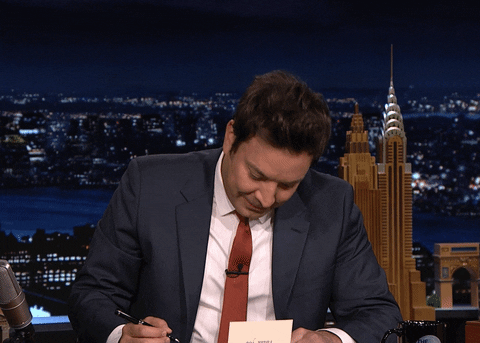 or letter should be sent, it is best practice to send it 24 hours after your interview, as it keeps you at the top of the mind with those you met with, but at the same, not being intrusive.
or letter should be sent, it is best practice to send it 24 hours after your interview, as it keeps you at the top of the mind with those you met with, but at the same, not being intrusive.
Here are the basic points you should include in just about any thank-you note you send after an interview:
- Express thanks for the interviewer’s time
- Briefly reinforce why you’re interested in the job and why you’d be a good match
- Consider adding something that you and the interviewer discussed while getting to know each other that makes the thank-you email more personal
- Offer to answer any questions they might have
- Close your email by reiterating your appreciation for the interview and asking about the next steps
Here is a sample template of how the email or letter can be structured:
Hi [person’s name],
It was such a pleasure to meet you today to discuss [role you applied for] at [company name]. The position sounds like exactly the type of job I’m looking for, and I believe my experience in/with [accounts receivable/Java programming/managing a team] would help me thrive in the position.
If there are any additional questions that I can answer, please let me know. Thanks again for meeting with me to speak about this exciting opportunity!
Best regards,
[your name]
For more information on Thank You Notes and what should/should not be included, check out our blog Why Thank You Notes Matter!
Now that you have read and learned more about some of the challenges that you might encounter before or during an interview, and how to beat them, you are now ready to go conquer that interview and hopefully get that dream job!
Remember, if you ever need help refining your application documents feel free to make an appointment with someone from our career team on Handshake!
